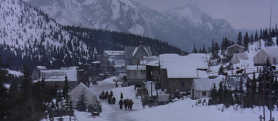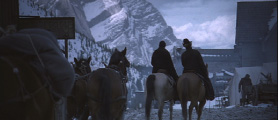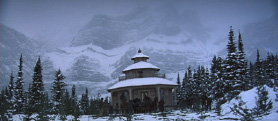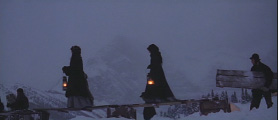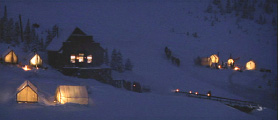| What went wrong? I suppose the real answer
is probably more complex than this, but the simplified explanation is
that he made a beautiful movie, one that moves very deliberately, true in spirit and tone to its literary roots.
But the market for that particular product is minute. That's pretty much the end of the story.
The plot is this: a young woman and her dying mother arrive in Kingdom Come, a tiny gold mining town in the mountains of Northern California. What in the world would persuade them to go to such a place? The entire rinky-dink town is a few shops and a bordello (what else is there to do in the mountains in Winter?), all basically controlled by the guy who owns the mine, and it turns out that he managed to amass this incredible wealth by trading his wife and infant daughter for the claim to the mine. Now test your ability to predict what will happen in a 19th century novel. Guess who the new arrivals in town might be. Guess what will happen to the mother. Guess what will happen when the daughter finds out who her father is, and that he got rich by selling her. Guess what he will do then. Sigh. There have been times in my life when I have wondered if Charles Dickens was a total idiot, until I realize that everyone else in the century milked the same kind of cow. Pick up a 19th century novel and get ready for the dramatic and tragic coincidences, the pessimism, the cynical view of human nature, and each character's inability to forgive himself or anyone else. Actually, in the novel there were far more silly and impossible plot twists that the movie wisely ignored (1) Just as Mr Big finally convinces the girl that she's his daughter, they read a note that the mother left behind after her death, saying that Mr Big's daughter died, and the girl with her was actually the daughter of the guy who bought them. Yeah, I know what you're thinking. Victorian writers probably didn't have to take math in school, and they were apparently incapable of understanding that you can't have an 18 year old daughter by a wife you haven't seen for 21 years. Presumably Mr Big's math was as bad as Hardy's, despite his business acumen (2) the real father of the girl, presumed dead, not only is still alive, but shows up in Casterbridge! Yeah, I know, what are the chances? Look, they thought this kind of crap was great stuff back then. I mean, what are the chances of Moll Flanders ending up having a happy affair in America, finally finding happiness and prosperity after all the misery in her life, then finding out that her lover was her own son? There must have been some LSD in the drinking water in England in the 19th century. Actually, to be fair, even the dim witted Victorian critics realized that Hardy's plotting was improbable (and improbable by their standards was very improbable indeed!), but he was admired for his style, and for doing his homework on the history and dialect of the region. The screenwriter made two other good choices, in my estimation.
I felt there were a couple of things that didn't work as well.
Anyway, the team has a solid collective resume when it comes to interpreting Thomas Hardy. Twenty years ago, Nastassja Kinski was Tess in Polanski's version of "Tess of the D'Urbervilles". The director Michael Winterbottom earlier filmed a version of "Jude the Obscure". I guess they know their stuff. Frankly, this film only took the barest outline of a plot from Hardy, but it held his spirit intact. The performances are generally solid, although everyone was apparently instructed to perform in a muted, mumbling, underacting style that makes the low-octane film even more soporific. Even on her best day, Kinski's energy level is not likely to earn her the lead in an Ethel Merman biopic, but in this film she plays a weak, dying woman, so she mumbles even more quietly than usual. On the other hand, I reckon that is what she was supposed to do. They all made a sincere and generally successful attempt to capture the spirit of Thomas Hardy.
|
|||||
|
Milla
Jovovich once again showed her dedication to becoming a serious
actress. She was downright homely, she had ugly teeth, and she sang
unbearably. Of course, she is normally lovely, has a radiant smile,
and has had a fairly successful singing career, so she was willing to
do what was necessary to develop the character. Sarah Polley was
similarly dedicated in the role of the daughter.
If all that sounds good to you, the execution is excellent. They did what they tried to do. The fact that a film has a miniscule audience doesn't make it a bad film. You might be in that miniscule group. Some reviewers loved it. But the movie business can be heartbreaking. |
||||
|
|||||
